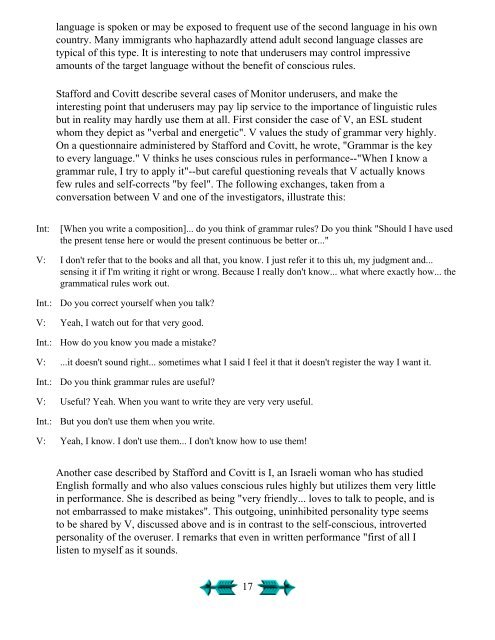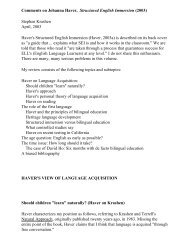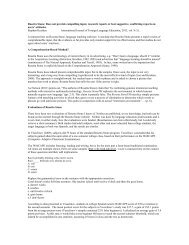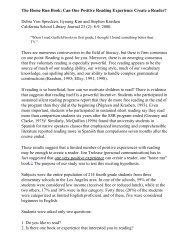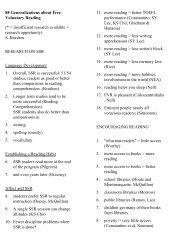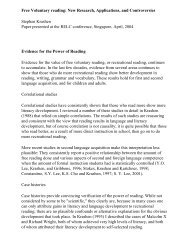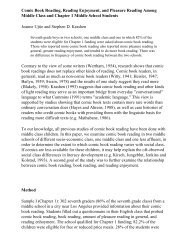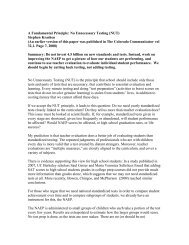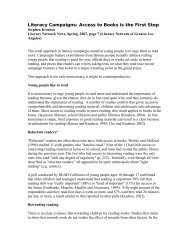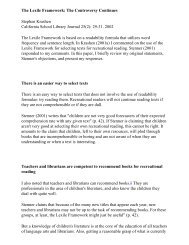Second Language Acquisition and Second ... - Stephen Krashen
Second Language Acquisition and Second ... - Stephen Krashen
Second Language Acquisition and Second ... - Stephen Krashen
You also want an ePaper? Increase the reach of your titles
YUMPU automatically turns print PDFs into web optimized ePapers that Google loves.
language is spoken or may be exposed to frequent use of the second language in his own<br />
country. Many immigrants who haphazardly attend adult second language classes are<br />
typical of this type. It is interesting to note that underusers may control impressive<br />
amounts of the target language without the benefit of conscious rules.<br />
Stafford <strong>and</strong> Covitt describe several cases of Monitor underusers, <strong>and</strong> make the<br />
interesting point that underusers may pay lip service to the importance of linguistic rules<br />
but in reality may hardly use them at all. First consider the case of V, an ESL student<br />
whom they depict as "verbal <strong>and</strong> energetic". V values the study of grammar very highly.<br />
On a questionnaire administered by Stafford <strong>and</strong> Covitt, he wrote, "Grammar is the key<br />
to every language." V thinks he uses conscious rules in performance--"When I know a<br />
grammar rule, I try to apply it"--but careful questioning reveals that V actually knows<br />
few rules <strong>and</strong> self-corrects "by feel". The following exchanges, taken from a<br />
conversation between V <strong>and</strong> one of the investigators, illustrate this:<br />
Int: [When you write a composition]... do you think of grammar rules? Do you think "Should I have used<br />
the present tense here or would the present continuous be better or..."<br />
V: I don't refer that to the books <strong>and</strong> all that, you know. I just refer it to this uh, my judgment <strong>and</strong>...<br />
sensing it if I'm writing it right or wrong. Because I really don't know... what where exactly how... the<br />
grammatical rules work out.<br />
Int.: Do you correct yourself when you talk?<br />
V: Yeah, I watch out for that very good.<br />
Int.: How do you know you made a mistake?<br />
V: ...it doesn't sound right... sometimes what I said I feel it that it doesn't register the way I want it.<br />
Int.: Do you think grammar rules are useful?<br />
V: Useful? Yeah. When you want to write they are very very useful.<br />
Int.: But you don't use them when you write.<br />
V: Yeah, I know. I don't use them... I don't know how to use them!<br />
Another case described by Stafford <strong>and</strong> Covitt is I, an Israeli woman who has studied<br />
English formally <strong>and</strong> who also values conscious rules highly but utilizes them very little<br />
in performance. She is described as being "very friendly... loves to talk to people, <strong>and</strong> is<br />
not embarrassed to make mistakes". This outgoing, uninhibited personality type seems<br />
to be shared by V, discussed above <strong>and</strong> is in contrast to the self-conscious, introverted<br />
personality of the overuser. I remarks that even in written performance "first of all I<br />
listen to myself as it sounds.<br />
17


